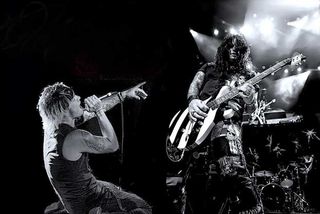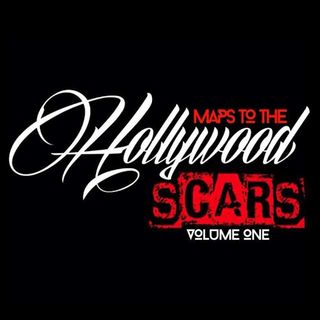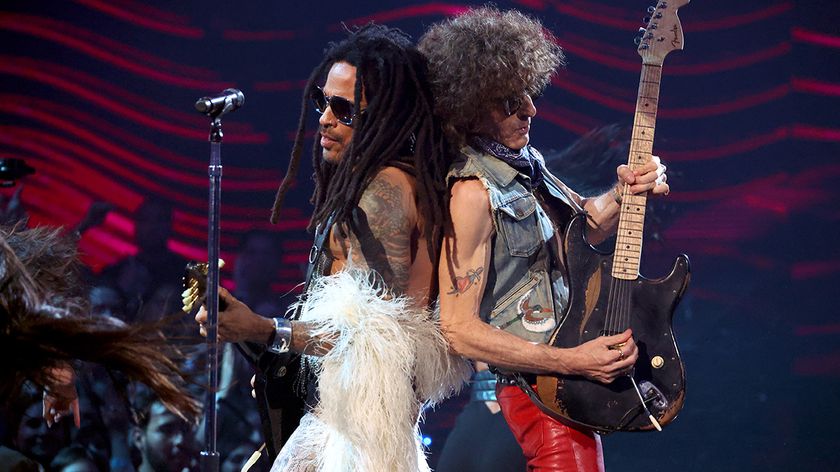JamesDurbin and Quiet Riot's AlexGrossi Talk 'Maps to the Hollywood Scars'

Quiet Riot guitarist Alex Grossi and American Idol finalist James Durbin recently announced a new collaboration, Maps to the Hollywood Scars.
Volume One, the duo’s debut five-song EP, which was released today (February 17), sheds light on the darker side of Hollywood and the music industry—at least from the perspective of two of rock’s hardest-working artists.
Songs like “Roads” and “The Lost Boys” showcase the stinging one-two punch of Grossi’s ace guitar playing and Durbin’s powerful voice, while “Never Ending Ride” is a window to a post-apocalyptic world of ruin.
I recently spoke with Grossi and Durbin about Maps to the Hollywood Scars, Volume One—which is available now via Amazon and iTunes—and more in this exclusive interview.
How did this collaboration come about? How did you guys meet?
GROSSI: I met James in 2011 via a mutual acquaintance. I remember being taken back, not only by his obvious vocal prowess but by his knowledge and love for real rock n' roll. Then, last year I went to a Vegas show he was doing, and we ended up jamming together at the after-party.
DURBIN: After the Vegas show I was involved in ended, I unexpectedly received an email from Alex sending me some instrumentals. I took a listen and was immediately inspired. We started sending ideas back and forth and before long decided, hell, why not make an album or two?
How would you describe the EP in terms of its sound—and maybe how it relates to some of your past projects?
DURBIN: We both have our own influences, and there's an age gap between us, but I think that works to our advantage as far as the writing and crafting goes. It’s all loosely based around rock n’ roll, so it’s not hard for us.
Get The Pick Newsletter
All the latest guitar news, interviews, lessons, reviews, deals and more, direct to your inbox!
GROSSI: It's honestly like nothing I have done to date. We’ve both been involved in many different projects, but this happened so quickly and organically, it really stands on its own.
You’ve mentioned that this project was meant to showcase the darker side of Hollywood and the music biz. Can you elaborate on that?
GROSSI: It's not really about selling the industry—or Hollywood—down the river. It's more of a reflection of where the record industry was, is and where it's going. What once gave artists and record labels a medium to actually sell music has now become a place where the general consensus is that music is free. Where some people will gladly spend $4 on a cup of coffee without batting an eyelash but feel totally fine about illegally downloading a song or record that cost thousands of dollars and countless hours to create, produce and market.
What was the writing process like?
GROSSI: I usually just start with a chorus chord progression and then add the riffs and the guitar "window dressing" around that. I like to leave things wide open for the vocalist to do their thing, and that’s exactly what James did.
DURBIN: I keep a collection of lyrics and melodies in my phone and on my computer. As soon as I hear music, my brain immediately goes through my subconscious notebook. I tend to draw from fantasy or personal experience but usually end up matching the two of them together. The songs Alex wrote immediately fit with some of the lyrics and lonely melodies I’ve had for years.
Let’s discuss three standout tracks from the album: “Roads,” “The Lost Boys” and “Never Ending Ride.”
DURBIN: “Roads” is my answer to anyone who is curious about rock n’ roll. The simplest way to put it comes from the song itself: “It’s never pretty or fair, but we like it here, not for the money or the glory, but the chandelier.”
“The Lost Boys” was directly inspired by the Eighties cult movie of the same name. It was actually the first song I completed and demoed for Hollywood Scars. It goes by that fantasy/personal experience inspiration format.
“Never Ending Ride” is one of those songs that just wrote itself. I’m not sure if it’s about having hope in a hopeless world or about two lost souls trying to find life in a post-apocalyptic world. In many ways, it’s a companion song to “Roads."
James, what was the biggest lesson you learned from being on American Idol?
DURBIN: I don’t think I’ve figured out what the biggest lesson is yet, but one thing I’ve learned for sure is that at the end of the day I’m happy, grateful and blessed to have been given the opportunity to be an artist for a living. I’ve learned a lot about myself since being on American Idol. It was an epic life experience. I made some life-long friendships and got to work with some of my heroes. I don’t think it will ever stop teaching me things.
Alex, can you give me an update on Quiet Riot?
GROSSI: Quiet Riot has a lot of shows on the books as well as a new record coming out later this year via Frontiers Records. The Quiet Riot documentary, Well Now You're Here, There Is No Way Back, has been in active rotation on Showtime for a couple of years now. You can check it out at quietriotmovie.com. I’m so proud to be a part of such an iconic heavy metal band's continuing history.
What’s your current guitar setup like?
GROSSI: My preferred amp is the PRS Archon. It encompasses what I believe every amp should be. It can go from crystal clean to full-blown high-gain rock without losing clarity. I did the entire new QR record with a 1x12 25-watt Archon combo, and it didn't miss a beat. As for guitars, 2017 will be my 20th year as a PRS endorser. I’ll never play anything else. They can take a beating on tour and still sound great in the studio the next morning. I am also really digging the new Mooer pedals. They’re tiny but sound as good if not better than pedals eight times their size.
What gives you the most satisfaction about this new project?
GROSSI: What excites me most is the fact that James and I did this of our own free will, without anyone feeding us song ideas, lyrics or concepts. It was a creative process where we could be ourselves musically and professionally.
DURBIN: Like Alex said, this is our project. We own it and we’ve grown it. It’s been a pleasure writing, recording and laughing with each other, and I can’t wait for our collective audiences to hear what we’ve created.
Follow along on Facebook:
• Maps to the Hollywood Scars

James is a guitarist and freelance writer who's interviewed some of the biggest names in music. He is the author of four books and his writing credits include work for Guitar World, AXS and Yahoo! as well as for his hometown newspaper where he writes on a variety of topics with both passion and humor. As a guitarist, he's performed everywhere from local bars and nightclubs to some of the biggest stages in front of thousands of music fans.

“We had 15 minutes left, and it was time to go… I just started playing that riff. Then Lenny goes, ‘Whoa, what’s that?’” Lenny Kravitz guitarist Craig Ross reveals the serendipitous roots of a Kravitz classic

“The concept of the guitar duel at the end was just appalling”: Crossroads is an essential piece of '80s guitar lore, but not every guitar legend was a fan of the film









